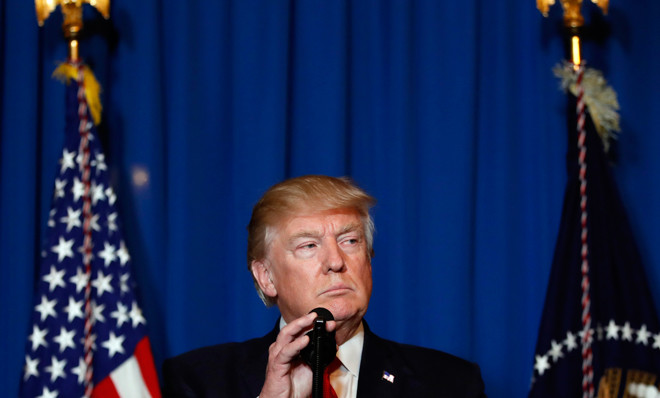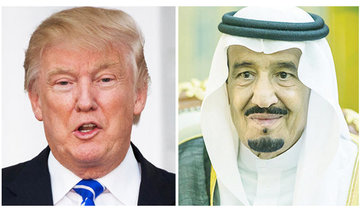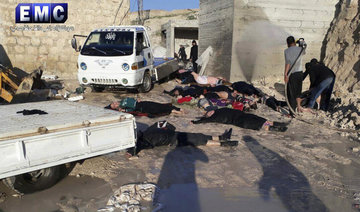WASHINGTON: The debate in Washington swirled yesterday over strikes in Syria approved by President Donald Trump, the first for the US against the regime of Bashar Assad.
The White House sold them as a military and political success, while experts emphasized the deterrence impact but questioned the broader implications for the six-year-old conflict.
White House spokesperson Sean Spicer described the strikes as a “decisive, justified and proportional” response to what the US believes was the use of chemical weapons by the Assad regime on Monday.
Spicer laid out to reporters a “72-hour-evolution” for Trump from being briefed on the Khan Sheikhun atrocity on Tuesday morning followed by interagency and national security meetings, and leading up to authorizing the strikes on Thursday evening before they commenced at 7:40 p.m. ET.
A US official who spoke to Arab News on condition of anonymity categorized three goals and justifications for Trump’s action. The official said “promoting regional stability, deterring the use of chemical weapons, and protecting a civilian population” prompted the decision on Trump’s 76th day in office.
‘A display of strength’
For experts and close watchers of Syria, however, there were more reasons for Trump to act.
Faysal Itani, a resident senior fellow with the Atlantic Council’s Rafik Hariri Center for the Middle East, told Arab News that a combination of internal and geopolitical reasons triggered the US action.
He added that the US President “didn’t have to do it, especially (given) that he hadn’t committed to any red line — like his predecessor Barack Obama (did) in 2012 — and was not constrained by the fate of Assad.”
The 59 Tomahawk missiles fired from two US Navy destroyers in the East Mediterranean granted a “display of strength and toughness that could help Trump abroad and at home,” said Itani.
“This is his idea of American power, and he probably felt embarrassment and frustration after declaring that Assad’s removal from power is no longer a priority one week before the attack.”
Geopolitically, US allies in the Middle East that welcomed the strikes had “pressed the US to do something about Syria,” added the expert.
‘Tilt toward Tehran is finished’
Assad’s backers were also said to be in the US calculus in planning the operation. “This is a turning point,” former US diplomat and defense official Lincoln Bloomfield told Arab News. “It starts with the US reasserting its leadership and reconnecting with the Arab world,” he added. The attack on Assad’s airfield means “the US tilt toward Tehran is finished.”
Itani cautioned, however, not to overstate the implications of the limited US response. “We don’t necessarily go anywhere from here,” Itani said. The value of deterrence and punishment are the primary accomplishments of the operation, he added.
“If I were Bashar Assad, I wouldn’t use chemical weapons again; in that aspect the US achieved deterrence and punishment but it doesn’t mean anything beyond that,” he added.
Bloomfield disagreed, pointing to Trump’s references to the carnage and the killing of Syrians, and noting that the US President “didn’t limit his comments to chemical weapons.” In the post-strike trajectory, said Bloomfield, “if the Assad regime continues to attack hospitals, then there is an obligation for the US to act with other countries.”
Russia-US ties
The US military operation, both Itani and Bloomfield contended, has complicated if not blocked any Trump efforts for a rapprochement with Moscow.
“Russia has to make very tough decisions,” said Bloomfied. “It is guilty of using military weapons to kill civilians on a large scale, but it can choose an agenda of cooperation with the US in Syria to move toward a legitimate process.”
US Secretary of State Rex Tillerson is scheduled to arrive in Russia next Tuesday as US-Russia tension grows at the UN Security Council and on separate investigations.
The US Defense Department announced on Friday that it is looking into whether Russia participated in the Syrian chemical weapon attack. If such a hypothesis is proven, US sanctions could be ratcheted up on the Kremlin.
On the ground in Syria, Itani said the airfield strikes could possibly jeopardize or delay the US plans for the battle in Raqqa against Daesh, while in contrast they make the idea of establishing safe zones more possible.
Riad Hijab, a Syrian opposition leader and chairman of the High Committee of the Syrian negotiations, told a policy crowd in Washington yesterday that he submitted to the White House a “plan to establish safe zones in several areas in Syria.”
Hijab met with officials at the Pentagon, White House and the State Department as well as with members of congress but he maintained that the opposition was “neither consulted nor briefed on Trump’s military planning.”
The strikes in Syria added muscle and leverage to US policy, the experts agreed. But without a clear US political and integrated national security strategy for the conflict, the outcome could be short-lived.
























